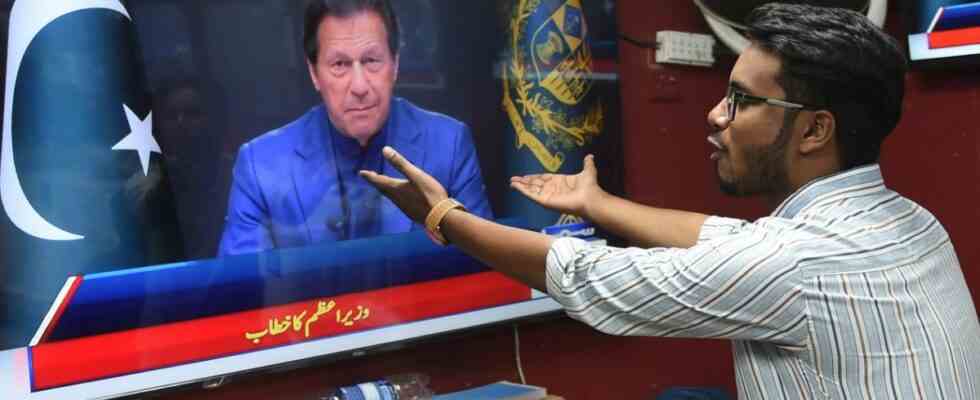On the day of the Russian invasion of Ukraine, Imran Khan sat next to Vladimir Putin as a guest of state – not exactly ideal images for a head of government who depends on international help to avert impending national bankruptcy. If Khan wished for a different timing for his visit to Moscow, he gave no indication.
After his return, Pakistan’s prime minister avoided condemning the Russian invasion of the neighboring country. Khan tacked on it, leaving Pakistan with mild regrets about “the situation between Russia and Ukraine.” At the same time, he tried to publicly reduce the complicated relationship with Moscow to two useful deals: They wanted to buy gas and had agreed to import two million tons of grain, it said in Islamabad – without mentioning a word that the wheat for Pakistan had previously come from Ukraine.
The West would have liked to hear harsh tones directed at Moscow, but Pakistan reacted with outrage to a letter to this effect from 22 diplomatic missions in Islamabad. Khan publicly asked, “Are we their slaves?” Pakistan abstained from voting on the UN-Ukraine resolution, as did China, India and 33 other countries.
On February 24 of all days, the day the Russian invasion of Ukraine began, Pakistan’s prime minister met Russian President Vladimir Putin in Moscow.
(Photo: Mikhail Klimentyev/Imago/ITAR-TASS)
The reluctance may also have something to do with the fact that Khan and the Pakistani military had only just managed to repair the battered relations with Russia. Both countries had been bitter enemies during the Cold War, Islamabad stood with Washington and supported the holy warriors in Afghanistan to drive out the Soviet army. Four decades later, Pakistan doesn’t want to upset the Kremlin. Any upset – according to the view in Islamabad – would play into the hands of arch-rival India.
From a Western perspective, the Ukraine war may be dominating all political efforts at the moment, but it’s different for Khan; he is distracted because he first has to get rid of a problem in the immediate vicinity: the opposition wants to overthrow him and has tabled a motion of no confidence. It has never been so tight for Khan. Gone are the days when he could always use his nimbus as a cricket legend to his own advantage and the competition seemed hopelessly divided. For a long time, Khan hardly had to fear her. But now? “The chances are not good for him,” commented the newspaper dawn.
Khan calls opposition ‘bandits’ and ‘mafia’
On the other hand, everyone knows that Khan is a fighter. He will do everything in his power to tame suspected dissenters and rebels in his own ranks before the vote in parliament, possibly in just a few days. Uncertainty is mounting among his supporters, as Khan’s PTI party – together with its allies – only has a majority of 17 votes.
Whenever Khan feels pressure, his favorite thing to do is step out onto the open stage and give the determined “Kaptaan”. As captain, he once led his national cricket team to World Cup victory. That was thirty years ago, but the beleaguered prime minister is banking on his reputation as a motivator and strategist still standing. Almost every day he increases his attacks on the opposition, whose leaders he vilifies as “bandits” and “mafia” and more or less openly threatens corruption proceedings as soon as he survives the vote of no confidence. His rivals mostly belong to established political dynasties, the Bhutto clan and the Sharif clan. Both camps are currently sticking together tactically to pry the prime minister out of office.
Never one of those circles that have dominated Pakistan for decades as a feudal class or industrial tycoon, Khan doesn’t draw on any dynastic heritage, instead relying on his reputation as an athlete. And so, as the Pakistani columnist Hamid Mir recently noted, he stylized himself as the savior of the nation.
Many remember how Khan once cried out that he would rather take his own life than beg the world for credit. However, the prime minister later had to collect aid, as Pakistan is dependent on rescue packages from the International Monetary Fund (IMF). And Khan is looking for proximity to China, which is expanding connections through Pakistan to the Indian Ocean for its Silk Road.
Poverty, rising prices, lack of prospects and bomb terror
Pakistan’s largest financial newspaper business recorder reported, citing government sources, that Islamabad is receiving Chinese aid in the amount of 21 billion US dollars secured, this is not officially confirmed. One thing is certain: Khan needs these billions. He has promised new subsidies for fuel and electricity since the Ukraine war has pushed up prices. This in turn makes talks with the IMF, which is supposed to bring further aid on the way, more difficult.
This increases the pressure on a prime minister who has already lost popularity. In a poll in January, 55 percent of those polled said that Khan’s party was governing worse than expected. A regional vote in the border area with Afghanistan was lost to Khan months ago. Four years after the national election triumph, the head of government is increasingly disenchanted. The promised departure of 2018 – for many it did not come true. Poverty, rising prices and a lack of prospects for young people remain the most pressing problems – alongside the extremists’ bombing terror.
The vote of no confidence is now the greatest political danger for the 69-year-old prime minister. At the same time, many are asking themselves: Where is the military actually? So far, Khan has kept the generals in check; no Pakistani head of government is strong enough to endure a confrontation with the army for long. Khan’s Information Minister Fawad Chaudhry dismissed speculation that the military had already switched sides to the opposition. However, the military is good at hiding its influence. And so it remains uncertain how the generals have positioned themselves.

